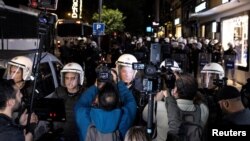The number of journalists jailed in Turkey more than doubled in the past year, as experts warn that the government is increasing pressure on free expression.
Data released from the New York-based Committee to Protect Journalists (CPJ) on Wednesday shows 40 journalists in prison in Turkey in relation to their work as of Dec. 1, 2022 — a steep increase from the 18 behind bars in 2021.
The data makes Turkey the fourth most prolific jailer of journalists globally behind Iran, China and Myanmar. Globally, CPJ found 363 journalists in prison for their work.
The new cases in Turkey are the result of two investigations that took place in June and October, said CPJ's Turkey representative, Özgür Öğret.
"When we look at the first half of this year, new arrests of journalists in Turkey were rare," Öğret told VOA, noting that the CPJ even saw releases at that time.
Operations in the capital Ankara and the predominately Kurdish city of Diyarbakır, however, changed that course.
"These two investigations were almost as extensive as the operations carried out against the Kurdish press as part of the KCK operations in the early 2010s," he said.
The KCK, or Kurdistan Communities Union, is a political group aligned with the Kurdistan Workers Party, or PKK, a militant group that Turkey and the United States have designated as a terrorist organization.
The new arrests in Turkey this year involve journalists working for or associated with Kurdish media, CPJ data shows. In many cases, Öğret said, the journalists are still waiting for indictments in their cases.
The media freedom advocate said he traveled recently to Diyarbakır, where more than a dozen journalists were arrested in June. He said that media in the city fear more harassment and investigations will come as Turkey prepares for elections.
Parliamentary and presidential elections are scheduled for June 2023.
Kurdish media in Turkey often face accusations of supporting or promoting terrorism related to the PKK.
But Veysel Ok, co-director of the Turkish legal nonprofit, the Media and Law Studies Association (MLSA), told VOA earlier this year that police often fail to recognize Kurdish media.
"The problem here is the identification of Kurdish and Kurdish journalism with terrorism," he said.
Turkey's embassy in Washington did not immediately respond to VOA's request for comment.
David Phillips, director of Columbia University's Peace-Building and Human Rights Program, said that media freedom is "suffering" in an increasingly authoritarian Turkey.
"The freedom of press is seized by the government in Turkey and this way the freedom of press of the other media outlets are blocked," said Phillips, who served as a senior adviser to the U.S. Department of State under Presidents Bill Clinton, George W. Bush and Barack Obama.
Phillips and other analysts have cited how Turkey's Radio and Television Supreme Council, known as RTUK, has revoked licenses and the country's press advertising agency has withdrawn ad revenue from critical media.
In June, RTUK blocked VOA's Turkish-language content and the German news agency DW's websites after the public broadcasters declined to apply for licenses as requested by the regulator.
The regulator has previously dismissed claims that its actions are aimed at censoring critical outlets.
RTUK's chair has said on social media that the regulator "protects the rights of legal broadcasters against illegal broadcasters in our country."
Phillips said that some of Turkey's laws are used against media and opposition voices, including terrorism laws and those against insulting "Turkishness" or the president.
The expert believes that a disinformation law approved by parliament in October is "designed to restrict freedom of expression in Turkey."
Öğret agreed that the new law is troubling, saying, "It stands as a tool that can be used against the whole society."
A court Wednesday ordered the arrest of journalist Sinan Aygül, in the Kurdish-majority Bitlis province, for allegedly spreading disinformation, over comments he posted and later retracted on Twitter.
It is the first time the law has been cited in a case.
The Reuters news agency reported that Aygül later posted about the incident, saying that after he made the comments public, a local governor told him the story was untrue.
Aygül, who is chair of the Bitlis Journalists Association, apologized for writing on Twitter without confirming the story with authorities.
Noting that Aygül had deleted his post and apologized, Progressive Journalists Association chair Can Güleryüzlü said, "No one can be arbitrarily arrested, especially someone who corrected himself."
"The Constitutional Court should immediately annul the said legal regulation in order to prevent it from turning into a source of new disproportionate penalties," Güleryüzlü said.
Turkey's record on media freedom and human rights came under scrutiny when a delegation of 11 international media and human rights groups visited the country in October.
"Following their visits to Turkey, these organizations raised concerns about the ongoing arrests and investigations of journalists, as well as concerns about the safety of journalists and the independence of the judiciary," Phillips said.
Pınar Kızılcalı contributed to this report, which originated in VOA's Turkish service. Some information is from Reuters.







